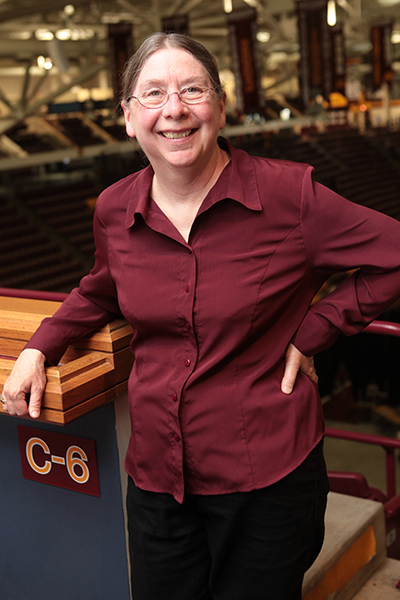Longtime biology instructor and instructional lab manager Jane Phillips is retiring in June. As she counts down the days to retirement, she took time out to reflect on her CBS experience.
A beloved instructor to many CBS students, Phillips taught thousands of biology students over 25 years as an education specialist with the college. Her approach to teaching is rooted in a firm belief in the importance of treating students with genuine positive regard. She brings that same ethos to her work with colleagues across the college and the University. Phillips managed the college’s instructional laboratories and served as associate director and co-director of the department of Biology Teaching and Learning, and served on University-wide committees. Phillips received numerous awards for her contributions to the college and the University including the President’s Award for Outstanding Service and the University of Minnesota Academic Staff Award.

At the time? I’m not sure. But in hindsight, it was my parents. My mom worked full time in the postwar 1950s and 60s when few of my friends’ mothers were working. She was really good at what she did. My dad was an entrepreneur, always spinning new ideas. The two of them had great senses of humor, had lots of fun, and were full of love. What better role models could I have had?
How did you become interested in the life sciences?
I was always interested, as far as I can remember. I got every Girl Scout badge that had to do with science, had a spider collection, spent hours outdoors, and loved reading about animals. My love for microbiology was kindled by a high school teacher who I assisted in preparing for and setting up labs (making media, pouring plates, streaking out bacteria) and cemented by a random TA who invited this sophomore college student into his lab as I was walking by. What they were doing was so cool. I was hooked.
What does teaching and training students mean to you?
It means I touch the future. And the students keep me challenged, engaged, and motivated.
What has changed and what hasn’t changed at the U of M since you arrived?
A big change is that we really have become almost paperless! This sounds like an odd item to choose, but what it signals is a huge shift in the classroom, the office, and everywhere to digital communication, records, data management, and more. It is at the point that when I have to do something with paper, my immediate response is “who should I contact about getting this process into a digital form?”
What hasn’t changed, or if it has, it has only gotten stronger, is the pursuit of excellence. When I came in 1990, it seemed like the U was coming out of a hard period and that there was universal commitment to make the U better. It has worked. Still more to go, but we are definitely a good way down the road.
What people stand out from your time here, whether leaders, colleagues or students?
I am so impressed with our students – the ones who start and run student groups like Biology Without Borders, Biological Sciences Research Club, CBS Student Board, and more. I’m impressed by the students who have persevered in the face of huge life issues like death of a parent, suicide of a friend, or sexual assault. They show great strength of character and spirit. I’m impressed by the staff who make this place run. I’m including the best people on earth – the teaching lab staff – but also all the people in student support, research support, outreach, safety, financial, administration. I admire all the faculty and staff who push the boundary of human knowledge through their research. Almost everyone here has their eye on the goal and works very hard to make this University and this world a better place. And I got to help. How cool is that?
What’s the most unusual or amusing thing that happened to you during your years here?
Anyone who knows me knows that I can find amusement in practically everything. So I’m not sure I can identify one thing that stands out. Although remembering Elmer Birney tell a joke, laughing so hard tears rolled down his face, always makes me smile.
What’s the most important thing you tried to convey to students?
To respect themselves. There is one person you will see in the mirror every morning and every night for your entire life – you need to be sure you really like and respect that person.
What’s the most important thing you learned as a teacher?
How little I know and how much there is to learn. The cool thing is that, along the way, I learned how to learn.
What will you miss most?
This is easy: All the great and amazing people, plus the stimulating environment that they create.
What will you miss least?
The long hours. It is true, a person is supposed to be able to control their work hours – clearly I never learned that trick.
What are you going to do in your retirement?
Uh, not work. And spend time really breathing in this amazing planet before I’m not on it anymore.
Posted 4/30/15